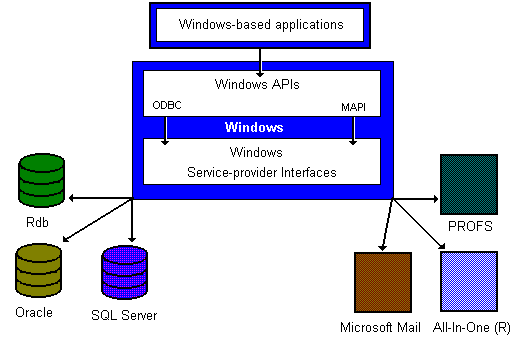Integration with Desktop (OLE/WOSA)
Access to BackOffice services such as SQL Server through Open Database Connectivity (ODBC), Mail & Exchange through Messaging API (MAPI), SNA through the WOSA SNA APIs, and Systems Management Server through DMI offers integration with Windows and Microsoft Office desktop applications. This offers companies the necessary tools to build networked applications through standard, network-independent interfaces and services.
Integrating Interfaces
The Windows Open Services Architecture (WOSA) is a major focus of Microsoft's goal to provide an open environment for the development and use of Windows-based applications. Far broader than an API, WOSA is an architecture that promotes the easy integration of Windows and Windows-based applications within heterogeneous enterprise-wide computing environments. WOSA provides seamless access to three categories of information resource services: common application services, communication services and vertical market services. WOSA's component services are defined in cooperation with hardware manufacturers, corporate developers, and independent software vendors through the Open Process program. The WOSA effort has the backing of hundreds of industry members. Microsoft has adopted de jure specifications for WOSA where relevant.
Common application services:
Open Database Connectivity (ODBC). ODBC provides a common way to access data from heterogeneous environments. It is an open standard that has been defined by industry groups including ANSI, the SQL Access Group and X/Open, with input from additional software developers, rendering it open and vendor-neutral. As a portable API, it can be a common, cross-platform data access language for both the Windows and Macintosh environments.
Messaging API (MAPI). Developed in cooperation with more than 100 independent software vendors, MAPI provides a common way for Windows-based applications to access a variety of electronic messaging services in enterprise environments. Through MAPI, a single application -- for example, a workgroup scheduling application -- can access a company's range of messaging systems, including various e-mail systems, Voicemail, and fax. Microsoft has refined MAPI in consultation with XAPIA, the standard-setting body for X.400 communications.
Windows Telephony. The Windows Telephony API gives applications easy access to the telephone network and will facilitate visual call control; integration of electronic mail, voice mail and fax; and desktop audio and video conferencing. The specification was developed in cooperation with about 40 companies in the telecommunications and PC industries, including network operators, telephone system makers, chip makers, software developers, voicemail providers and PC vendors. Every major PBX manufacturer has announced intent to support the APIs and to provide access to previously closed, proprietary PBXs.
ODBC and MAPI Illustrated

Pictured above are two components of WOSA, Open Database Connectivity (ODBC) and the Messaging API (MAPI). Through a consistent and open architecture, Windows-based applications can transparently access key services across multiple vendor implementations. These services can span different hardware and operating system environments.
License Service API (LSAPI). To automate software licensing and reduce the burden of implementing custom licensing systems, Microsoft has worked closely with industry participants to create LSAPI. Participants in LSAPI development include the Software Publishers Association and the Microcomputer Managers Association.
Communication services:
Windows SNA API. The SNA API standardizes a corporation's method for host connectivity by providing open access to existing IBM SNA API categories.
Windows Sockets API. This API makes it easy to integrate Windows-based and UNIX-based applications across a network and to provide a single interface for Windows-based applications to communicate with Sockets-based applications across a variety of transport protocols including TCP/IP, AppleTalk and IPX/SPX.
Microsoft Remote Procedure Call (RPC). The Microsoft RPC API supports the Open Software Foundation's Distributed Computing Environment (DCE) RPC.
WOSA extensions for vertical markets:
WOSA Extensions for Financial Services. The WOSA extensions for branch banking applications define a standard API that developers can use to access varied services such as receipt printers and magnetic PIN-pads. Microsoft worked in cooperation with the Banking Systems Vendor Council to develop this specification.
WOSA Extensions for Real-time Market Data. These WOSA extensions allow Windows-based applications to receive live market data (such as stock quotes and news) in a standard format, no matter the data source. The effort to develop this standard specification was initiated by the Open Market Data Council for Windows, a group of market data vendors and trading and brokerage systems suppliers.
WOSA extensions for Controls, Engineering and Manufacturing